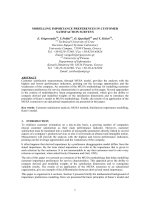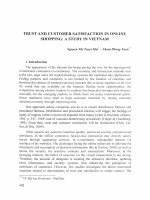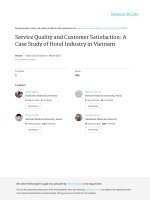DAS customer satisfaction survey report
Bạn đang xem bản rút gọn của tài liệu. Xem và tải ngay bản đầy đủ của tài liệu tại đây (192.94 KB, 10 trang )
DAS Customer
Satisfaction
Survey Report
A Report from the DAS Customer Relations Committee
Submitted by Ngoc Tran, ICN Marketing Manager
April 17, 2003
Contents
Pages
Executive Summary .......................................................................1–3
DAS Customer Survey Results .....................................................4–5
DAS Customer Survey Comments..............................................6–12
Research Statistical Terms .............................................................13
Customer Satisfaction Survey ..................................................14–19
-i-
DAS Customer Satisfaction Survey Report
Executive Summary
Introduction
As of this writing, the Department of Administrative Services (DAS) is in the proposal
stage, and has yet to be signed into legislation. Part of the planning for this new endeavor
includes assigning customer relations, sales and marketing goals to the Customer
Relations Committee.
In late January 2003, Mollie Anderson, the DAS Director Designee, asked for a
benchmark to measure customer satisfaction before DAS implementation and after DAS
implementation. The benchmark would serve to identify areas of strength and those
which needed improvement for each of the four and a half departments to participate in
the DAS merger. As one of its priorities, the committee began planning for such a survey
February 5, 2003 starting with members of the committee which included employees
from the four and a half DAS involved agencies (DGS, ICN, ITD, IDOP, IDRF), as well
as non-DAS involved departments (DOT and DHS) to provide feedback.
Past Research
The committee discovered that several customer satisfaction surveys have been and are
currently being conducted by the DAS departments, each using different methods, at
different times and for different purposes.
DGS has several surveys measuring customer satisfaction in different areas of the
department including printing, fleet, purchasing and maintenance. ICN has several
ongoing customer satisfaction surveys measuring overall satisfaction with service pricing,
quality, ordering processes and ICN’s communication with customers. ICN also has
surveys measuring specific services such as voice conference bridging and video
conferencing needs. ITD recently conducted one-on-one question and answer sessions
with employees and customers on overall satisfaction. IDOP has several surveys
measuring satisfaction and statistics on the hiring process, and satisfaction of training
services. IDRF held several focus groups measuring comments relating to information
technology, human resources services, financial management, and facilities
management/procurement/printing services. However, no current research exists to
measure all four and a half departments consistently in customer service. New research
was needed to integrate and benchmark customer service for each department.
Research Planning
In the initial planning stages of the research, the committee considered what method
would provide the best solution to gathering a bewildering amount of data quickly –
whether printed survey, phone interview, live interview or focus group. The committee
determined that an electronic survey that could be printed and routed by department
heads would offer the best solution for getting quantifiable data that would also allow
open comments to be recorded. A survey approach was also selected because survey data
would provide the best method for benchmarking and comparison for future surveys.
-1-
Survey Design and Analysis
The committee decided to measure each DAS department separately, and that Ngoc Tran,
ICN’s Marketing Manager and a committee member with a background in designing and
implementing surveys, would submit a draft survey within two weeks. The draft
consisted of a six-page quantitative survey designed to answer the research question,
“How satisfied are proposed DAS customers with their level of customer service, and
quality of select services?” Additionally, the survey measured what ways customers
would like to communicate with the proposed DAS – by phone with live representative,
by phone with automated menu, by email, etc.?
The first page of the six-page draft contained a closed-ended question to identify the
customer as a being from a small, medium or large organization. The survey did not ask
for the respondent’s name. A closed-ended question followed that listed methods for
customers to communicate with DAS and a five-point Likert scale to record their
preference.
The rest of the survey was divided into separate pages for each of the four and a half
DAS departments. Each page contained closed-ended questions on five services chosen
by the department with a five-point Likert scale for the subjects to record their level of
satisfaction. Subjects were also able to record any comments they had in blank lines
provided after each section.
Sampling and Implementation
The draft was routed to each DAS department to fine tune and verify that the services
listed in their sections were the ones the departments wanted measured. After changes
were made, the survey was sent to state of Iowa department heads as an electronic Word
file by email with instructions to return the survey to the ICN within two weeks. The ICN
served as a central point of collection and survey reporting.
Survey Analysis
A spreadsheet was created using Microsoft Excel to record and analyze the data. The
surveys were tallied to determine the percent of returned surveys to the total number
expected.
-2-
DAS Customer Satisfaction Survey Report
Each question was analyzed with the following quantitative methods using built in
function in Excel.
1. An average score was calculated.
2. A median (middle) score was calculated.
3. A mode (most frequently occurring value) was calculated.
4. A standard deviation to determine consistency of the responses was calculated.
The standard deviation is used to indicate the amount of confidence given to the
data.
Pie and bar charts were created to visually display the data.
Survey Results
The committee received a total of 38 surveys out of an expected 39, resulting in a very
impressive 97.4 percent return rate.
The survey results indicate that customers prefer contacting DAS by phone with a live
representative, followed closely with email, and then followed by using online services.
The least preferred methods of communication are by focus group, followed by survey or
comment card, and then by regular mail.
Most respondents (56%) are from medium sized departments having between 71 and 699
employees, followed by small departments with less than 70 employees (26%), and then
large departments with 700 or more employees (18%).
Results for the individual departments are represented in the accompanying charts and
graphs.
Conclusions
The research discovered that customers were significantly satisfied overall with IDRF
customer service and quality of services. Customers were fairly satisfied overall with
IDOP and ICN customer service and quality of services. Customers were slightly
satisfied overall with DGS, followed by ITD in customer service and quality of services.
This is the first phase of anticipated continued research, with additional surveys expected
after the DAS consolidation. Additional targeted surveys may need to be conducted in
each department in an effort to fine-tune the baseline.
-3-
DAS Customer Survey Results
April 2003
What are the best w ays for custom ers to
com m unicate their needs and service
orders to DAS?
7.28%
Focus Group
7.41%
Survey
9.00%
Leader Council
Sales Visit
10.59%
Online
14.16%
7.81%
17.64%
Phone Auto
8.07%
Phone w Rep
18.04%
Surveys Returned
100%
97.4%
50%
0%
0%
70 or less
26%
71 - 699
56%
0
4
3.36
3.53
3.11
3.72
1.08
1.36
25%
1
2
3
4
5
6
4.05
5
4
1.15
20%
How satisfied are you with the customer service
provided by this dept? (Overall Avg.)
3
2
15%
Legend:
Overall Average in All Questions
Per Departm ent
5
10%
What are the best w ays for custom ers to
com m unicate their needs and service
orders to DAS?
Focus Group
1.83
Survey
1.87
Leader Council
2.27
Sales Visit
2.67
Online
3.57
1.97
4.44
Phone Auto
2.03
Phone w Rep
4.55
How many employees does your
organization have?
700+
18%
5%
3.61
3.10
3.90
3.60
3.09
3
1.16
1
0.93
2
1.09
1.09
1.39
1.21
0.96
1
0
0
DGS
ICN
ITD
IDOP
IDRF
DGS
ICN
-4-
ITD
Range for
standard
deviation.
IDOP
IDRF
Standard
deviation.
DAS Customer Survey Results
April 2003
Highly Preferred
Com m unication Methods (5)
Focus Group
Survey
Leader Council
Sales Visit
Online
Phone Auto
Phone w Rep
Low Preference
Com m unication Methods (2)
0
0
2
4
12
4
21
3
21
0
5
10
15
20
25
2
3
3
3
5
1
11
2
9
0
2
4
6
3
7
7
2
8
1
3
0
0
2
4
8
10
12
Focus Group
Survey
Leader Council
Sales Visit
Online
Phone Auto
Phone w Rep
17
7
5
16
0
17
0
0
5
7
7
9
6
1
3
5
3
2
4
6
10
11
5
0
8
14
Average Preference
Com m unication Methods (3)
Focus Group
Survey
Leader Council
Sales Visit
Online
Phone Auto
Phone w Rep
6
Unpreferred
Com m unication Methods (1)
Preferred
Com m unication Methods (4)
Focus Group
Survey
Leader Council
Sales Visit
Online
Phone Auto
Phone w Rep
9
Focus Group
Survey
Leader Council
Sales Visit
Online
Phone Auto
Phone w Rep
8
10
-5-
10
15
20
DAS Customer Survey Comments
Customer Relations Committee – April 2003
Please tell us how you would like to communicate if different than the above? Or give us your overall
comments on how you would like to communicate.
Need multiple methods to communicate needs and services.
Via a menu: by choosing to purchase services rather than being required to use DAS.
A mechanism to submit comments and concerns in a timely manner could help to identify and
address problems and suggestions for improved services - all too often - actions leave employees
feeling like second rate citizens instead of a valuable resource - i.e. parking/bldg space. Survey or
comment card quarterly.
Communications needs to be very flexible, focus does not move to getting stuck with the process
vs. the results that were desired. (Sic)
Web based should be set up speech accessible.
DAS will need to make a lot of changes in order to work. I have a problem with the people that are
there now are setting up this DAS, what makes you think this will work when the old leaders will
still be there running the show. (Sic)
Prefer automated request for service system that provides on-line access to status of request. At
minimum monthly meetings with DAS liaison to discuss status, issues, and future needs. Prefer an
initial meeting with key identified agency personnel to fully discuss services to be provided and
frank discussion as to whether all your services are wanted. The meeting should include
information about costs for various factors.
Person to person whether via phone or personal visit.
Email probably works well for most situations. There are times when face-to-face communication is
in order. We hope that regardless of communication form, a focus on customer needs is apparent,
along with a desire to meet those needs to the extent possible.
Communication method needs to match the message - some questions are best answered by a live
representative, either by phone or in person. Some things can be best dealt with by a web site. The
most important element is to match the medium with the thing being communicated. It is not
possible to say that one method is best for all circumstances or messages. Automated phone menus
should only be used for structured and routine things like checking bank balances, movie times, or
open hours and there should always be a way to talk to a person.
Interested in communication providing most timely response and involves talking to "real" people.
We sometimes experience computer problems and outages so we would need alternative ways as
listed above to communicate our needs.
There is no one-size-fits-all best way for customers to communicate their needs… depends on the
issue. Sometimes phone is best, sometimes email is best. Customers should be able to communicate
the way that best suits them and their need. Clearly, phone, mail, email and web offer the most
immediate response while things like sales rep visits and customer council meetings aren't as
timely. However, some issues - like broad policy issues - lend themselves to customer council
meetings vs. a phone call. Need to be flexible. Automated phone menus are almost always
frustrating unless an easy, quick transfer to a human is assured. As a customer agency, we have had
little problem communicating our needs using a variety of methods. More problematic for us has
been how the agencies that provide these support services, most notably personnel services,
communicate with us, the customer. Deciding what things to communicate only through department
heads or directly to those other levels or both, or whether to identify an agency liaison or liaisons,
or when communication can be informal (verbal) vs. formal (written) are critical decisions that
seem now not always to be consistently made. Erratic/inconsistent communication to the customer
can lead to information not getting to the right place, information taking too long to get to where it
belongs, confusion about who's getting what, etc.
It would depend on what the need was.
-6-
DAS Customer Survey Comments
Customer Relations Committee – April 2003
DGS
Please give us your overall comments on DGS customer service or services.
•
•
•
•
•
•
I find DGS to be a very good agency in all your six questions.
Person who does typesetting is very RUDE! We job out those services when possible. Takes
forever to get business cards!
Very good; responsive, but slow.
Could improve accuracy of delivery in address changes, staff changes. Need to keep vehicles clean
and pull them up front for pick-up. Lots not well organized. Most recent news of move does not
have a firm plan or time frames - Does not provide increased efficiency or cost savings and appears
to be only politically driven. Turn around time - in some instances is extremely poor. Prices are
high - sometimes work has been completed twice. Typesetter has been rude - why do business cards
take 2 -3 months?
The friendliness/overall helpful attitude on the front lines is great - and highly appreciated. Couldn't
have a better crew in all areas. Communications regarding office moves and or repair: This area
leaves a lot to be desired due to the fact that there is no communication between agencies,
management, the power that be concerning moves and or changes within state buildings and or
agencies. Changes are good but people need to be informed and possibly asked their opinions due
to the fact that many changes closely affect employees and their work situations. When people are
not informed of changes moves the frustration that they endure leads to more frustration "not
knowing what's going on". Items to consider: the replacement of the freight elevator in the Lucas
Bldg within the first few weeks of its operation, it was non-operational. Quite a few individuals
were not even informed that it was up and running. The noise of the freight elevator leaves a lot to
be desired - the continuous buzzing that needs to be according to the Code is not only distracting
but phone conversations (and face to face ones) in the area are hard to conduct. Hallway doors are
continuously locked, broken, unusable. It seems to take forever to get something fixed. Mail center,
printing area of Lucas was completely divided in half without consideration to individuals that use
and work in area. Other half of room was sealed off with new all and entranceway for group
working on special project. The security comes to mind - state employees are told to be on the
lookout for people not working in your work area; yet no one has had the courtesy to inform the
state employees who use the mail center/printing area what was going on/introduce anyone etc.
Regarding office moves/communications, I would rate DGS poor. But as fellow state employees,
I'm sure they haven't been informed either. Past months experiencing problems with printing
services, especially involving outside vendors. Numerous times the wrong documents provided by
DGS to outside printers for reproduction. One case the outside printer followed instructions
provided by DGS and printed an entire job incorrectly, although we supplied the original artwork
and explicit instructions. More than once, DGS supplied old outdated file material to printer
resulting in incorrect documents. Experienced difficulties in billing for outside printing. Recently
two payment vouchers received for the same print job with only difference being $6. There was no
way of knowing why a second project had been awarded to an outside vendor. Had the dept not
double checked the payment vouchers, two payments would have been made for the same project. I
clearly appears that DGS printing services with outside vendors has dramatically decreased over
past months. Purchase requests often delayed with no reason, bids misquoted, instructions ignored,
billing statements confusing. While no complaints with products produced by inhouse printing staff
at DGS, it appears its service relating to outside vendors that need careful review, and where
appropriate changes to customer service.
Need to fix HVAC in Hoover building. We have hot/cold spots. Needs to be balanced with high
room temperatures on 5th floor. Cleaning needs to be improved. DGS relies too heavily on voice
mail and voice mailboxes are often full so we cannot leave a message. Vehicle depreciation
accounts have been "scooped" and not available to purchase new vehicles. Result is lower quality
vehicles and customer dissatisfaction.
-7-
DAS Customer Survey Comments
Customer Relations Committee – April 2003
•
•
•
•
•
•
•
•
•
•
•
•
DHS - design and construction needs to have trained project managers, know construction law,
infrastructure committee doesn't have a clue what they are doing. No leadership in this area, leave
agency's do there own projects. Very poor. (Sic)
Printing services - series provided for external printing jobs could be improved. Once an order is
placed, no information or communication from printing is ever given to the ordering agency.
Printing seems to have an issue with getting our agents licenses done on a consistent basis, which
would allow our agency to not have to reconfigure each time we receive a product.
We feel there are often cheaper places to order office supplies and furniture than those vendors who
have the state contracts, but often the process for buying from other vendors or from state agencies
is too cumbersome.
Very good.
We have experienced sub-par project management and untimely responses from representatives of
Building and Design and untimely responses and lost documentation from representatives of the
printing division.
Printing services: some problems with turnaround times have been experienced, many times on
large orders. We don't know where they're being printed so it's hard to follow up.
Recently our staff had a very bad experience with a state vehicle. The vehicle had not been serviced
(low on gas), the paperwork from the previous person was still in the van, and it stated they thought
there was a problem with the brakes. (If DGS had serviced it like they should, they would have seen
the comments. Another state employee should not have been assigned the car at that point.) The
power steering went out; perhaps that could not have been prevented. In short, this vehicle was not
properly maintained before being reassigned. Fortunately, this is not the norm, but warrants
mention.
Employee courtesy is poor. Improvement needed in the processing of hardcopy Pos. (get
lost/delayed in local mail) Office space issues assistance is almost non-existent, and at best "poor".
Timely responses to questions/concerns do not happen.
We only use DGS services in two very limited situations - external printing procurement and joint
fleet procurement. In both instances, the long-standing processes generally work fine. We have also
coordinated with DGS on various fleet, printing and procurement efforts on and ad hoc basis over
time and have generally found staff to be courteous and helpful.
I have used DGS in IT purchasing and contract interpretation.
We have a DNR employee that is located on the third floor of the Wallace building. He was
displaced in November of 2002 due to the reconstruction of the third floor, and his office has yet to
be reconstructed. The position is our storekeeper that provides services to the citizens and our
employees over the entire state of Iowa. The disarray of his working conditions is unaccepted to us.
Being displaced for this length of time greatly affects the services he can provide, and we feel his
office should have been rebuilt immediately before the construction on the other side of him began.
-8-









